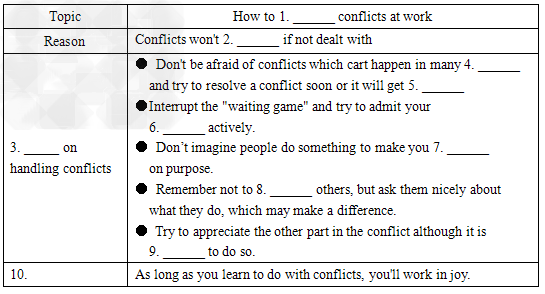任务型读写。
认真阅读下列短文,并根据所读内容在文章后表格中的空格里填入一个最恰当的单词.注意:每个空格只填1个单词,请将答案写在答题卡上相应题号的横线上.
You can't avoid a conflict at work. If you can avoid a conflict, it means you will win what you
want regardless of what the other person wants. Since the potential issue has not been removed,
it will simply reappear later. Here are the necessary steps to effectively get rid of conflicts at work.
★ Realize that some conflicts are unavoidable at work. On numerous occasions, conflict
and disagreement are likely to happen. But when a conflict happens it's not the end of the world.
On the contrary, it can be the beginning of an interesting learning process. Conflicts mean that
people care enough to disagree strongly. The trick is not to allow the conflict to go on forever.
★ Handle conflicts sooner rather than later. Solve a conflict when it starts, as it only gets
worse with time going by. Conflicts at work arise not from something that was said, but from
something that wasn't said! Everyone's waiting for the other to admit he's wrong and gets more
unpleasant after the conflict has lasted a while. It's essential to interrupt the "waiting game" before
it gets to that point.
★ Ask nicely. If somebody has done something that made you angry, or if you don't understand
their viewpoint or actions, simply asking nicely about it can make a world of difference. Never
assume that people do what they do to annoy or hurt you. Sometimes there's a good reason why
that person does what he or she does, and a potential conflict disappear right there. Do remember
to make an inquiry, not an accusation of any sort.
★ Appreciate. Praise the other part in the conflict. Tell them why it's worth it to you to solve the
conflict. This can be difficult as few people find it easy to praise and appreciate a person they
disagree strongly with, but it's a great way to move forward.

1. handle/ solve/ remove 2. disappear 3. Tips/ Suggest ions/ Advice
4. cases/ circumstances 5.worse 6. mistake(s) /fault (s) 7. annoyed/ hurt/ angry
8. accuse/blame 9. hard/ difficult 10. Conclusion
